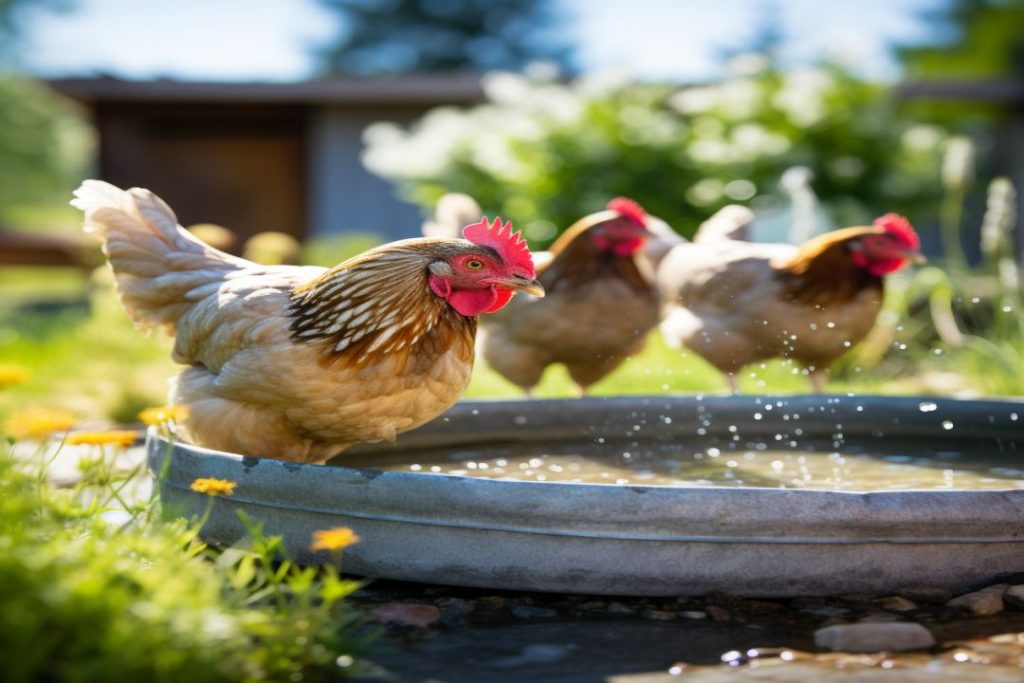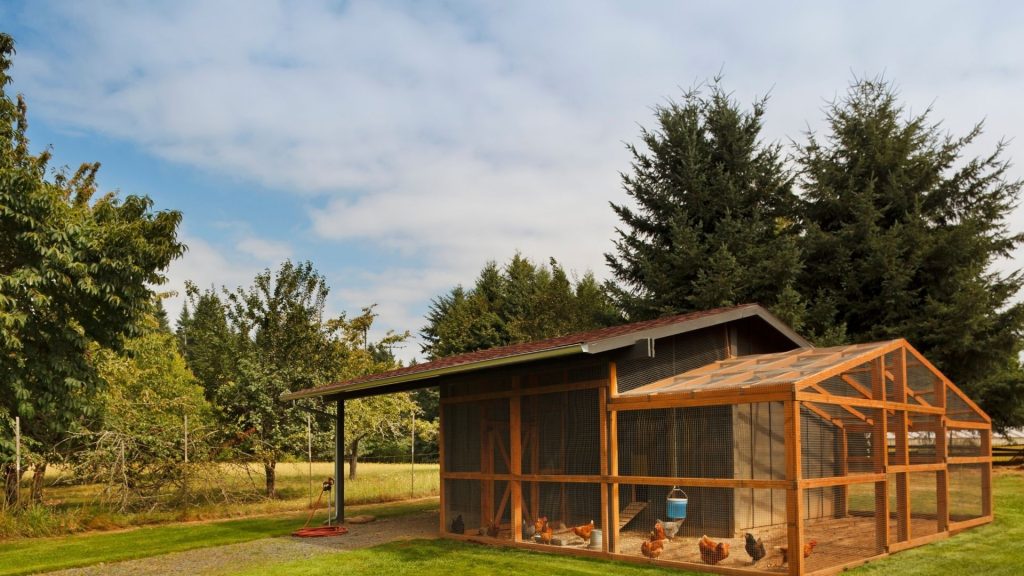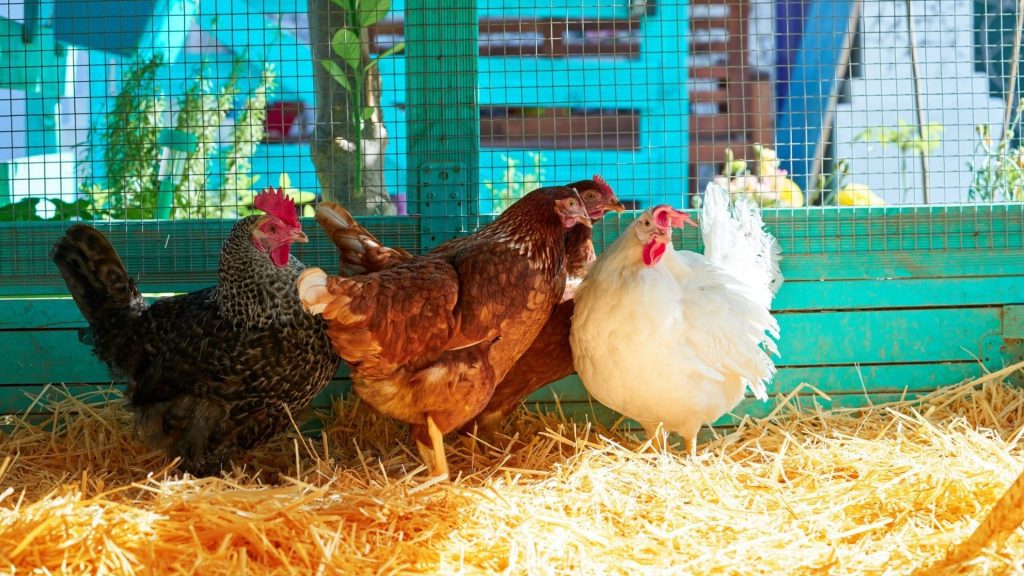Are you tired of dealing with the unsightly mess of chicken poop in your poultry water? It’s a typical issue that plenty of poultry owners deal with. But do not worry; we are here to thoroughly explain how to keep chickens from pooping in their water.
Imagine arriving at your chicken coop on a lovely morning, prepared to care for your beloved hens. You’ve been dreading the picture when you open the coop door: chicken droppings floating in the Waterer.
This is unhygienic for your chickens, and it requires frequent cleanup. Fortunately, using the appropriate methods, you can minimize this problem for your chickens.
Now to know more about it, let’s delve into the discussion below:
Why Is Clean Water Important For Your Chicken?
Clean water isn’t merely a nicety. It’s essential when it comes to nurturing the health and happiness of your cherished flock. Just like us humans, chickens depend on access to fresh and uncontaminated water to support their bodily functions and overall vitality.
But why is clean water such a pivotal aspect of their lives? Let’s dive into the reasons behind this and understand its profound impact on your feathered friends.
1. Nourishment Through Hydration
Consider water as the lifeline that fuels your chickens’ bodies. Much like the fuel we put in our vehicles to keep them running, water is similarly critical in ensuring that every physiological process in your chickens functions smoothly.
Water is at the core of these processes, from digestion and circulation to maintaining body temperature.
2. Vulnerability to Contaminants
Chickens are delicate creatures, sensitive to their environment. Their vulnerability extends to the quality of the water they consume. Imagine a scenario where their water source is contaminated – it’s akin to inviting trouble into their lives.
Unclean water can be a breeding ground for bacteria, viruses, and parasites, subjecting your chickens to various potential illnesses.
3. A Sanctuary for Disease
Dirty water is not just unsightly. It’s a breeding ground for diseases. It can wreak havoc on your flock. Your chickens are exposed to a myriad of health risks due to dirty water.
Drinking contaminated water becomes a gateway for illnesses and can spread rapidly throughout the flock.
4. Deterrence to Hydration
Imagine being presented with a glass of murky water – would you drink it? Chickens, too, possess a natural aversion to contaminated water. Instinctively, they steer clear of questionable water sources, even if it means depriving themselves of vital hydration.
5. Unraveling the Domino Effect
The impact of unclean water doesn’t stop at an individual level. When one chicken falls prey to disease from contaminated water, it creates a chain reaction.
The sickness can spread to other members of the flock, triggering a wave of health issues that can disrupt the harmony of your chicken coop.
6. Fertility and Egg Production
For those raising hens, the impact of clean water on egg production cannot be overstated. Your chickens’ general well-being is enhanced by clean water, which enables them to produce giant, healthier eggs.
The integrity of eggshells is also maintained by proper hydration, producing stronger eggs and less likely to break.
7. Crucial for the Young Ones
Chickens in their infancy require special care, including a pristine water supply. Just as you would be cautious about the water you give a human infant, the same care should be extended to chicks.
Clean water is the cornerstone of their vitality, from safeguarding them against disease to fueling their growth. So, let’s approach the task of providing clean water not as an obligation but as a privilege that contributes to the flourishing lives of our beloved feathered companions.
By prioritizing clean water, you’re not just offering a basic necessity – you’re gifting your chickens a life filled with health, vibrancy, and comfort.
What Are The Common Causes of Chicken Pooping in Water?
Understanding the reasons behind chickens pooping in their water is the crucial first step in finding solutions to this predicament. Chickens are inherently curious creatures, driven by their insatiable urge to explore their surroundings using their beaks.
This curiosity, though endearing, can lead to unexpected challenges, such as mistaking the water source for a convenient perch or a pecking ground.
1. A Matter of Proximity
The proximity of the water source to potential perching spots can inadvertently entice chickens to make the Waterer their temporary perch. It might seem like a strategic vantage point to them.
But for you, it means dealing with the aftermath of droppings in the water – a less-than-ideal situation for both parties involved.
2. Crowded Coops, Crowded Perches
Picture a crowded coop – chickens jostling for space, seeking a semblance of comfort amidst the chaos. When available perching spots become scarce, chickens become resourceful, seeking perches wherever they can find them. Unfortunately, this could include the Waterer, turning it into an unintended resting place.
3. The Temptation of Low-Hanging Roosting Bars
Coop design is another factor that can tip the scales in favor of chickens perching on their Waterer. If your coop features low-hanging roosting bars positioned directly above the water source, you inadvertently tempt chickens to roost and relieve themselves in the water. It’s like putting the roosting bar and Waterer in a game of unintended target practice.
4. Crafting Solutions through Coop Design
Recognizing the impact of coop design on chicken behavior can lead to innovative solutions. Strategically altering the layout and structure of your coop can substantially reduce the likelihood of chickens pooping in their water.
5. Elevate the Roosting Bars
Elevating the roosting bars is an effective way to discourage chickens from perching on their Waterer. Positioning the bars above the water source creates a clear boundary between the perch and the Waterer. Chickens will be less tempted to navigate the vertical distance for perching.
6. Spacious Watering Zone
Offering your chickens ample space for their daily activities can work wonders. When waterers are situated in an area with sufficient room to maneuver, chickens are less likely to use them as perches. Adequate space creates a clear distinction between resting areas and essential water sources.
7. Diversion Tactics
Chickens, like any living beings, benefit from mental stimulation. Provide them with alternative sources of entertainment within the coop. Hanging treats, interactive toys, or even a designated roosting area away from the Waterer can divert their attention and keep them from using the Waterer as a perch.
8. Strategic Nipple Waterers
Consider upgrading to nipple waterers, a brilliant alternative to traditional open water sources. Nipple waterers provide water through small, strategically positioned nipples that require a pecking action, making perching and pooping virtually impossible. This intelligent design keeps the water cleaner and discourages unwanted behaviors.
9. Coop Layout Remodeling
If you’re truly committed to resolving the issue of chickens pooping in water, consider a coop layout redesign. Consult with poultry experts or experienced chicken keepers to craft a coop layout that minimizes perching opportunities and maximizes the functionality of the Waterer.
10. A Flock of Solutions
A holistic approach is vital in preventing chickens from pooping in their water. By addressing overcrowding, coop design, and offering enticing alternatives, you create an environment where clean water remains uncontaminated and easily accessible.
Remember, a cooperative and stimulating coop setup benefits you and your chickens, fostering a cleaner and healthier living space for all. To sum it up, chickens pooping in their water is a behavioral challenge with solutions rooted in understanding and ingenuity.
By reimagining coop design, offering entertainment diversions, and considering the placement of waterers, you’re setting the stage for a coop environment that nurtures cleanliness and promotes your chickens’ well-being.
Let’s embark on this journey of coop cleanliness and improvement, enriching the lives of our feathered companions and fostering a harmonious coexistence.
How to Keep Chickens From Pooping in Their Water?
In poultry care, the challenge of chickens pooping in water can be met with inventive strategies and compassionate coop management. The journey to a cleaner, harmonious coop is both accessible and rewarding – underscoring your dedication to the well-being and comfort of your cherished feathered companions.
Providing Adequate Space for Unrestricted Movement
Ensuring chickens abstain from pooping in their water hinges on implementing strategies that foster an environment synonymous with cleanliness and comfort within their coop. A strategic combination of techniques can be employed to prevent the undesirable occurrence of water contamination caused by perching.
Chickens’ natural propensity to perch is often exacerbated in cramped or crowded conditions. In such scenarios, chickens utilize any available surface, even their Waterer, as a perch. The provision of ample space instills a sense of openness, discouraging them from utilizing the Waterer as a perch.
Elevating the Waterer to Deter Perching
A method that proves effective in discouraging perching behavior involves elevating the Waterer. By introducing a platform or stand, the water source is raised to a height that chickens can access for hydration but one that doesn’t encourage perching.
Elevating the Waterer creates a distinct boundary between the perch and the water source, reducing the likelihood of chickens using it as a resting spot.
Nipple Waterers: A Paradigm Shift in Hydration
Revolutionize your coop by adopting nipple waterers – a revolutionary alternative to conventional open waterers. These innovative devices dispense water through strategically positioned nipples, necessitating a specific pecking motion for water access.
The ingenious design of nipple waterers makes perching and contaminating the water nearly impossible. Furthermore, this innovative waterer design maintains the cleanliness of the water, minimizing the risk of contamination.
The Power of Regular Coop Maintenance
A pivotal strategy in preventing pooping in water involves consistent coop cleaning. Regular maintenance routines involve the removal of droppings and debris from the coop, effectively dissuading chickens from regarding waterers as suitable roosting spots.
Maintaining a clean and hygienic coop contributes to water cleanliness and fosters overall chicken health.
Entertaining Distractions for Engaged Chickens
Distracted chickens are less likely to engage in undesirable behavior like perching on waterers. Providing chickens with entertainment and diversions, such as hanging treats or engaging toys, keeps their minds occupied and reduces their inclination to perch on water sources.
Harnessing Natural Instincts through Foraging
Enhance your coop environment by tapping into chickens’ instincts through foraging opportunities. Scatter grains, seeds, or small treats around the coop to simulate the act of foraging.
This stimulating activity engages chickens’ minds and diminishes their propensity to perch on waterers out of sheer boredom.
Allure of Greens: Engaging Chickens with Edible Distractions
Introducing edible greens into the coop serves a dual purpose. Not only do these greens offer a healthy treat, but they also create a natural distraction for chickens. Chickens are less inclined to seek out waterers for perching engaged in pecking at fresh, leafy greens.
Coop Design: An Architectural Solution
Architectural adjustments to the coop layout can be pivotal in deterring perching behavior. Innovative coop design strategies can significantly minimize the temptation for chickens to perch on waterers.
Modifying Roosting Bar Placement
A strategic shift in the placement of roosting bars is a practical approach. Positioning roosting bars away from waterers ensures chickens have designated perching spots that aren’t linked to water sources.
A Breath of Fresh Air: Ventilation and Air Circulation
Proper ventilation is fundamental to a healthy coop environment. Adequate airflow maintains optimal conditions and decreases the likelihood of chickens seeking waterers for resting.
Exploring Variations in Perching Materials
Experimenting with different textures, thicknesses, and materials for perching surfaces can impact chickens’ perching tendencies. Offering designated outdoor perching areas can divert chickens’ perching inclinations away from waterers.
Offering alternative perch options diverts chickens’ attention away from waterers, fostering a diverse range of resting behaviors.
Innovative Waterer Placement
Strategic placement of waterers is another avenue to discourage perching. Consider elevated platforms or corners that aren’t conducive to roosting.
Positive Reinforcement: Cultivating Desired Behavior
Chickens, like other animals, can be trained. Positive reinforcement instills the habit of avoiding them, such as rewarding chickens for not perching on waterers.
Visual and Auditory Cues: Redirecting Behavior
Chickens are attuned to visual and auditory cues. Incorporating reflective surfaces or swaying objects can gently discourage perching on waterers.
Gentle Sprinkling: Dissuading Unwanted Behavior
A gentle sprinkling of water as chickens approach waterers can deter perching. The discomfort associated with this action dissuades chickens from using waterers as perches.
Embracing the Social Nature of Chickens
Chickens often mimic each other’s behavior. Encouraging a single chicken to avoid perching can trigger a chain reaction within the flock.
Bottom Line
In the end, now you know “how to keep chickens from pooping in their water?” keeping chickens from pooping in their water requires a combination of thoughtful strategies and a clean, comfortable environment.
Understanding the reasons behind your chicken’s behavior and implementing the right solutions ensures your chickens can access clean and uncontaminated water.



